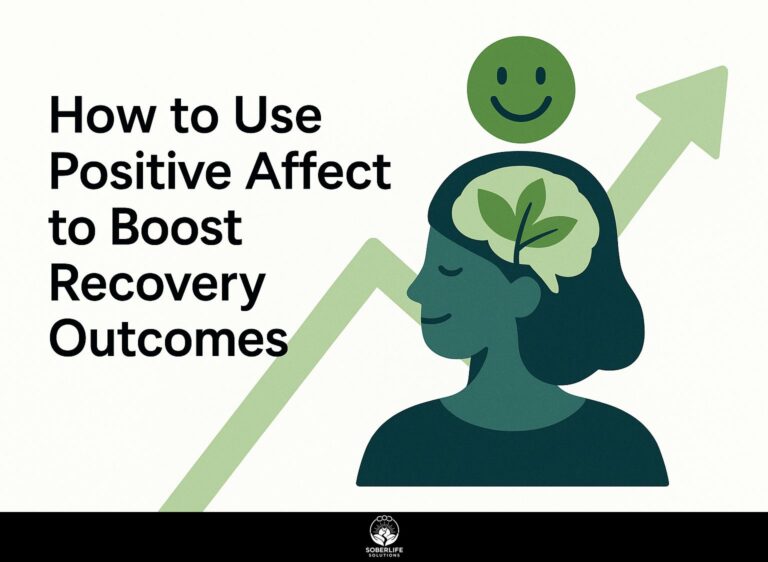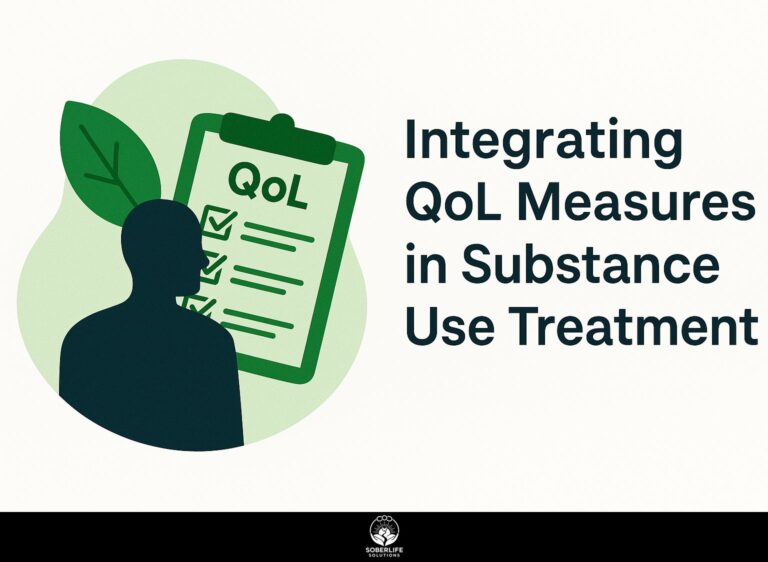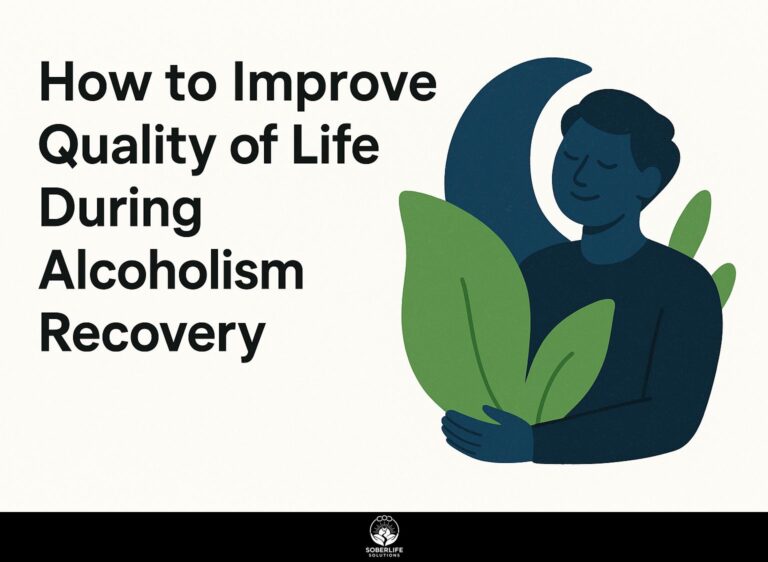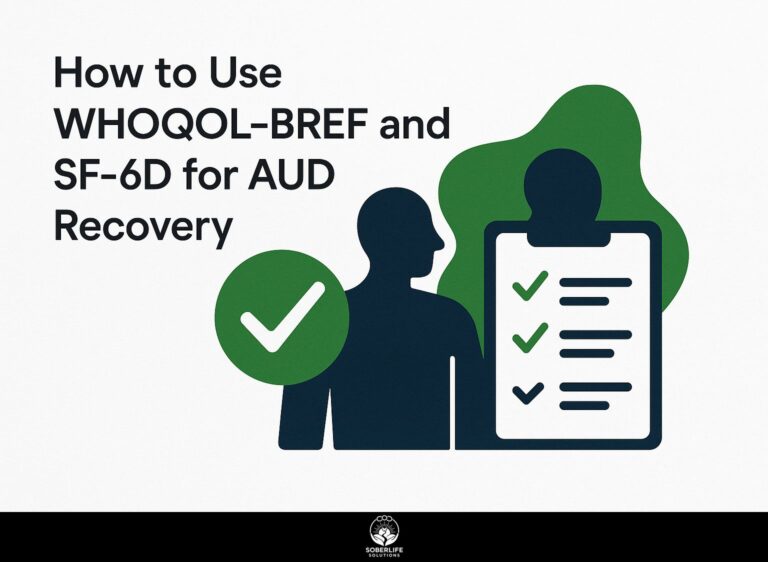Impact of Social Services on QoL in Recovery
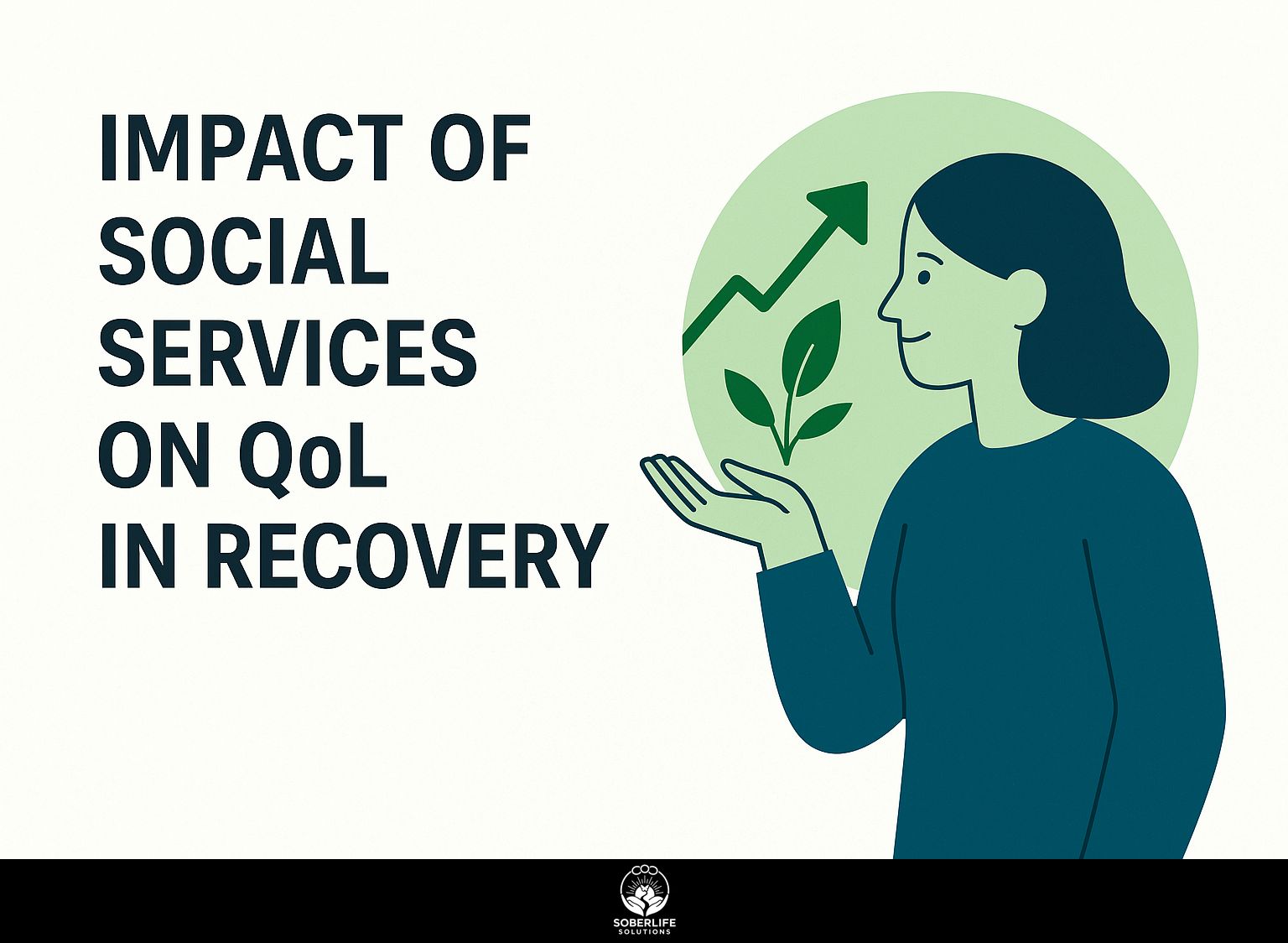
Social services greatly improve the quality of life for people recovering from addiction. Support from groups like The Phoenix and Alcoholics Anonymous can greatly help people as they work to overcome substance use disorder. This article looks at how social support systems help people get back on their feet, focusing on key services that help individuals aim for a better life. Learn how these services help change lives and build strength during recovery.
Key Takeaways:
Definition of Key Terms
Key terms like ‘social support’ and ‘recovery-focused relationships’ are important for grasping the structure of social services in addiction recovery.
Social support is the help, both emotional and practical, that people give each other. For example, groups like Narcotics Anonymous offer a place for people to share their experiences and build a sense of community, which helps with recovery. Additionally, research published in Nature highlights the crucial role of support networks in successful addiction recovery.
Meanwhile, recovery-oriented relationships involve connections that prioritize growth, encouragement, and accountability. Effective examples include mentorship programs where individuals with lived experience guide those in recovery through challenges.
Using tools like online forums or community apps can improve these relationships, making recovery easier and more focused on community support.
Importance of Quality of Life in Recovery
Having a safe and stable home is important for recovery. It supports people with substance use issues in remaining sober and improving their mental health.
Research indicates that individuals with a high quality of life (QoL) experience significantly better recovery outcomes. For instance, a study by The Phoenix found that approximately 70% of participants reporting high QoL also noted lower relapse rates. Supporting this, ResearchGate highlights the critical role of recovery capital in enhancing quality of life during stable recovery stages.
Helpful methods to improve quality of life during recovery include:
- Engaging in regular physical activity
- Pursuing hobbies
- Building supportive social connections
Incorporating mindfulness practices, such as meditation or yoga, can also improve mental resilience. These actions help improve mood stability and aid in maintaining long-term sobriety.
The Role of Social Services in Recovery
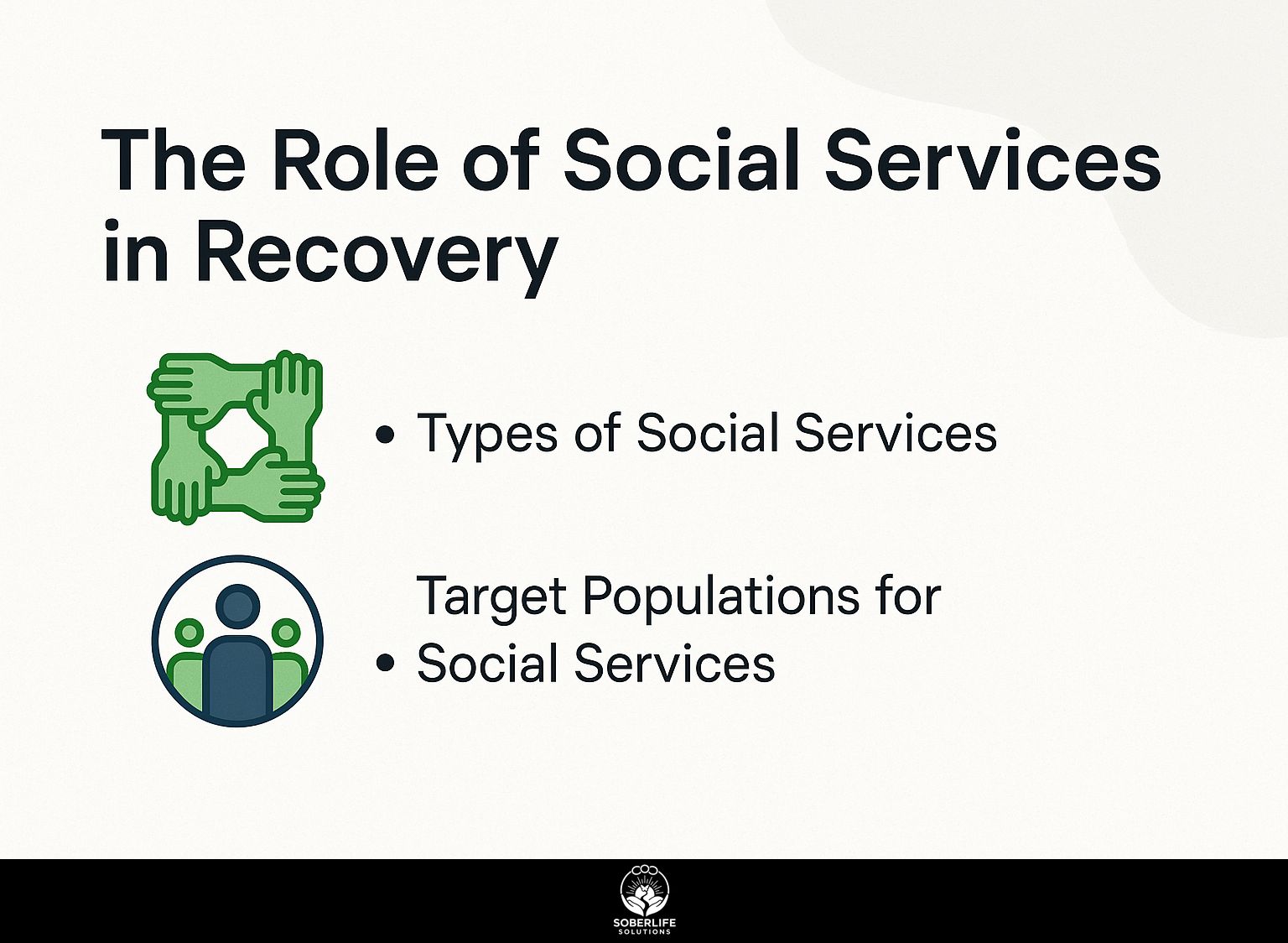
Social services include various programs to help people recover, such as counseling, support groups, and self-help programs. For an extensive analysis of counseling’s role in recovery, explore our overview on cost-free counseling for AUD recovery.
Types of Social Services
The primary types of social services in recovery include counseling, peer support groups, and recovery-oriented programs that address various needs.
Individual therapy offers one-on-one help, enabling clients to understand their emotions and habits in a secure setting.
Therapy groups like Alcoholics Anonymous help people feel part of a community with common experiences (our exploration of Narcotics Anonymous meetings provides further insights into global support networks).
Meanwhile, recovery-oriented programs may include life skills training, job placement services, or wellness workshops, which can ease the transition back into daily life.
People seeking structured help can find programs like SMART Recovery that provide resources and methods tailored to each person’s recovery journey.
Target Populations for Social Services
Social services target diverse populations, including individuals with substance use disorders, those with mental health problems, and marginalized groups in the recovery community.
Among these groups, young adults aged 18-25 often face significant barriers such as unstable housing and limited access to education. Studies show that 18% of this age group experience mental health issues, frequently compounded by socioeconomic challenges (for context, the World Health Organization provides detailed insights about adolescent mental health).
Programs designed for women, especially those who may be single parents, focus on specific needs like parenting help and job training. LGBTQ+ individuals face higher rates of discrimination, increasing the urgency for inclusive services.
Concentrating on these groups makes sure that resources go where they are most required.
Impact of Social Services on Mental Health
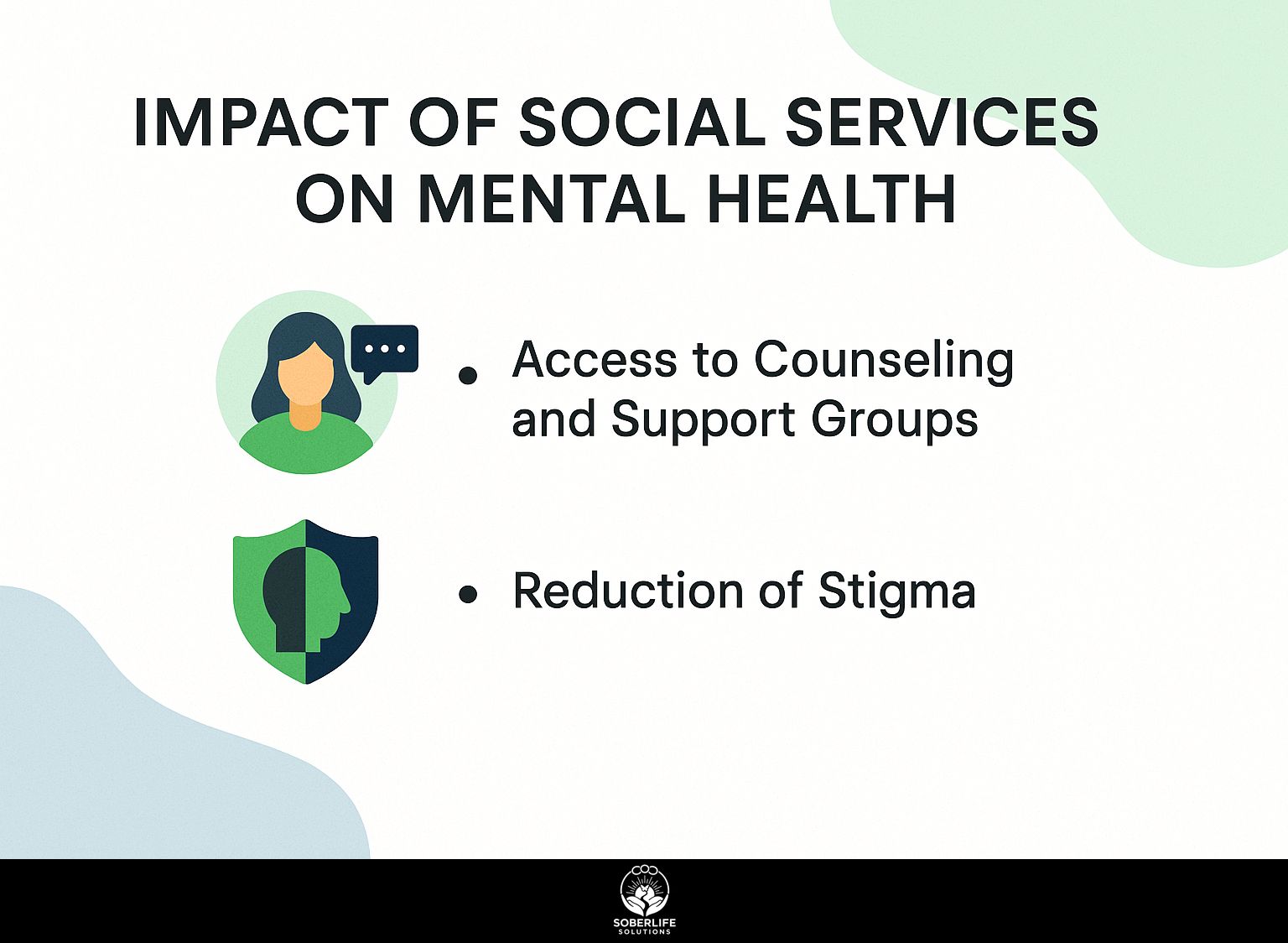
Social services play a big role in mental health by offering counseling and support groups, which improve people’s sense of social support. Those interested in the evolving landscape of mental health support might find the rise of virtual recovery groups particularly enlightening, as they offer a modern twist on traditional support systems.
Access to Counseling and Support Groups
Access to counseling and support groups can improve recovery outcomes by creating a structured environment for shared experiences and coping strategies.
Programs such as Alcoholics Anonymous (AA) and SMART Recovery have been effective, with research indicating that around 60% of those involved notice improvements in a few months.
These groups help people stay responsible and create a feeling of togetherness. People in the group often talk about their personal experiences, which helps others learn ways to handle their problems and understand what others in similar situations are going through.
Professional counseling offers personalized methods to meet specific needs, helping people recover.
Reduction of Stigma
Social services help lessen the negative perception of addiction and encourage acceptance and awareness in communities.
One impactful initiative is Mental Health First Aid, which educates the public on recognizing and responding to mental health crises.
Another example is the ‘Truth Campaign,’ which counters the stigmatization of addiction through relatable storytelling and peer support.
Community outreach programs, such as Alcoholics Anonymous and Narcotics Anonymous, also play a critical role by providing safe spaces where individuals can share their experiences without judgment.
By engaging with local people, these programs start discussions that help clear up confusion and encourage kindness for those facing addiction and mental health problems.
Economic Benefits of Social Services
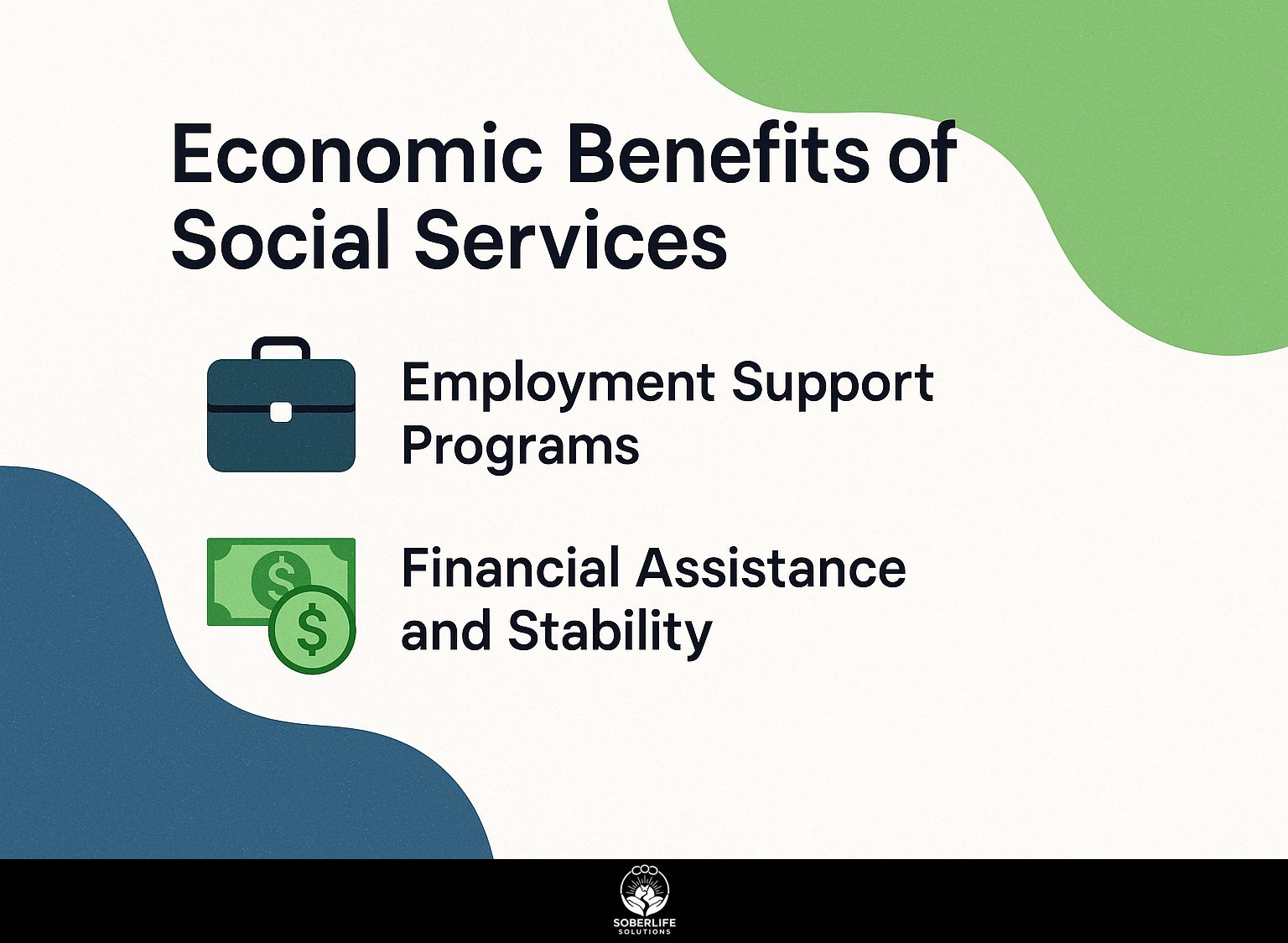
Social services help people by providing job training and financial help, which also benefits the economy. This approach aligns with the principles outlined in our analysis of the ongoing opioid crisis, highlighting how comprehensive support can enhance community resilience.
Employment Support Programs
Programs that help people find jobs are important for getting individuals in recovery ready for work, which improves their chances of keeping a job.
Programs like Project Recovery and The Ready, Willing, and Able program provide essential job training, placement services, and ongoing support.
For instance, participants in Project Recovery see an 80% employment retention rate after six months, compared to a 50% rate prior to joining.
These initiatives offer workshops on resume building and interview skills, using tools such as Skillsoft and LinkedIn Learning. By equipping individuals with both technical skills and confidence, they significantly improve their employability and overall quality of life.
Financial Assistance and Stability
Financial help programs offer essential aid for people in recovery, helping them gain stability during their change.
These programs often include important areas such as help with housing, medical insurance, and money for necessities.
For instance, organizations such as the Substance Abuse and Mental Health Services Administration (SAMHSA) offer grants specifically targeting housing stability for those in recovery. Local charities often provide vouchers for food and medical expenses.
Studies show that individuals receiving such support are 30% more likely to maintain sobriety long-term, highlighting the importance of these resources in enhancing overall quality of life during the recovery process.
Case Studies of Successful Social Service Programs
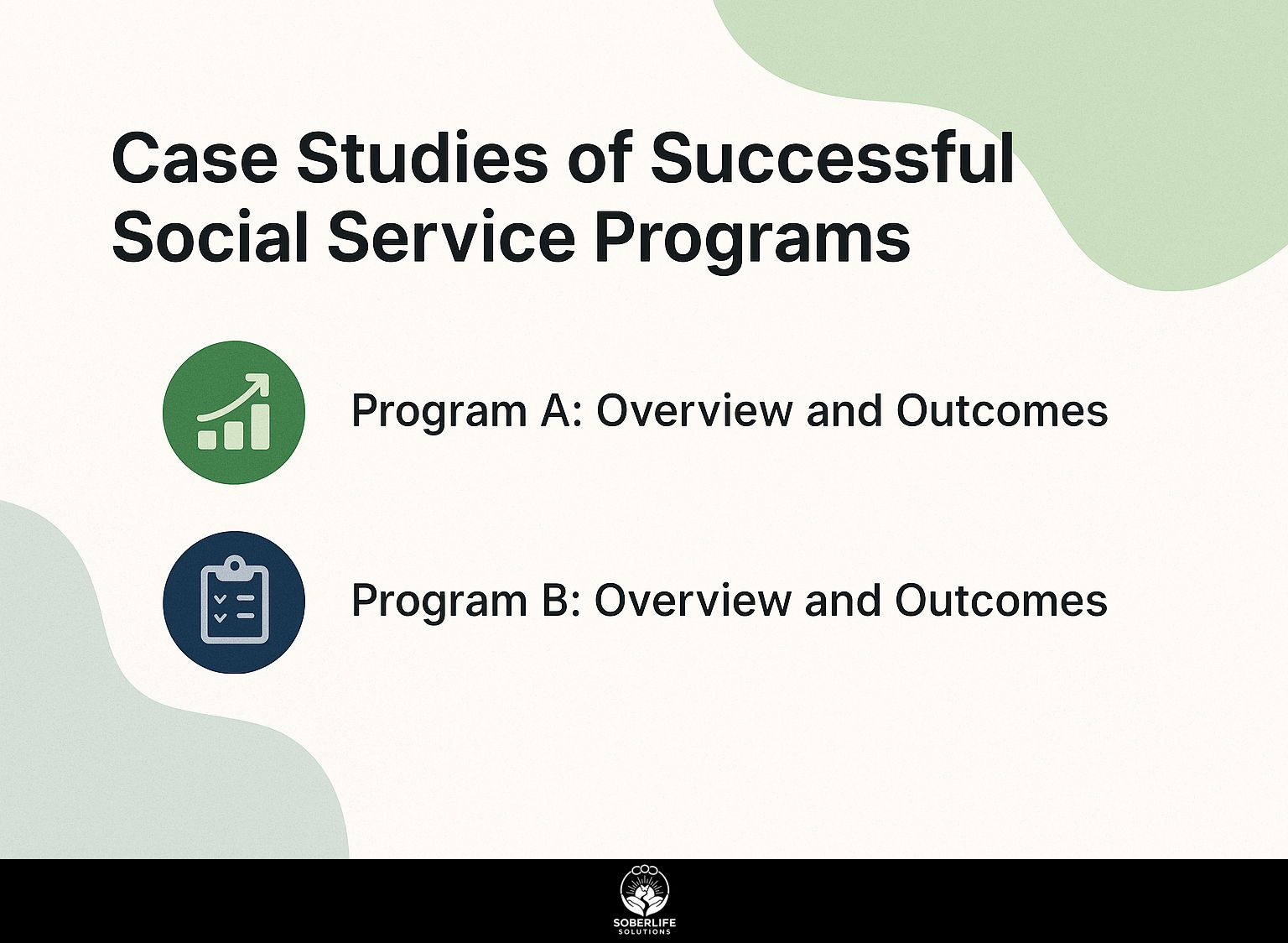
Looking at successful social service programs shows new ways to help with addiction recovery and make life better for people.
Program A: Overview and Outcomes
Program A has been very successful in improving recovery results by using a complete support system that provides counseling and peer support.
The program consists of weekly group counseling sessions, individual therapy, and structured peer support meetings.
Participants, primarily individuals in early recovery, report improved coping strategies and emotional resilience. For instance, 80% of attendees noted a reduction in relapse rates within six months of starting the program.
Feedback highlights the sense of community built through peer relationships, with many stating they felt more understood and less isolated. This complete method deals with both the medical parts of recovery and the important social connections needed for lasting success.
Program B: Overview and Outcomes
Program B, which integrates community engagement with recovery support, has demonstrated notable improvements in participants’ overall well-being.
Participants report a 30% increase in reported satisfaction after engaging in weekly peer-led workshops. Key parts include classes for learning skills like mindfulness and ways to handle stress, along with support groups that encourage open conversation.
One participant said, “Having a supportive group really changed my recovery process,” showing how the program focuses on shared experiences and helping each other.
By including these elements, Program B improves personal recovery and builds community connections, resulting in ongoing involvement and better mental health results.
Challenges and Limitations of Social Services
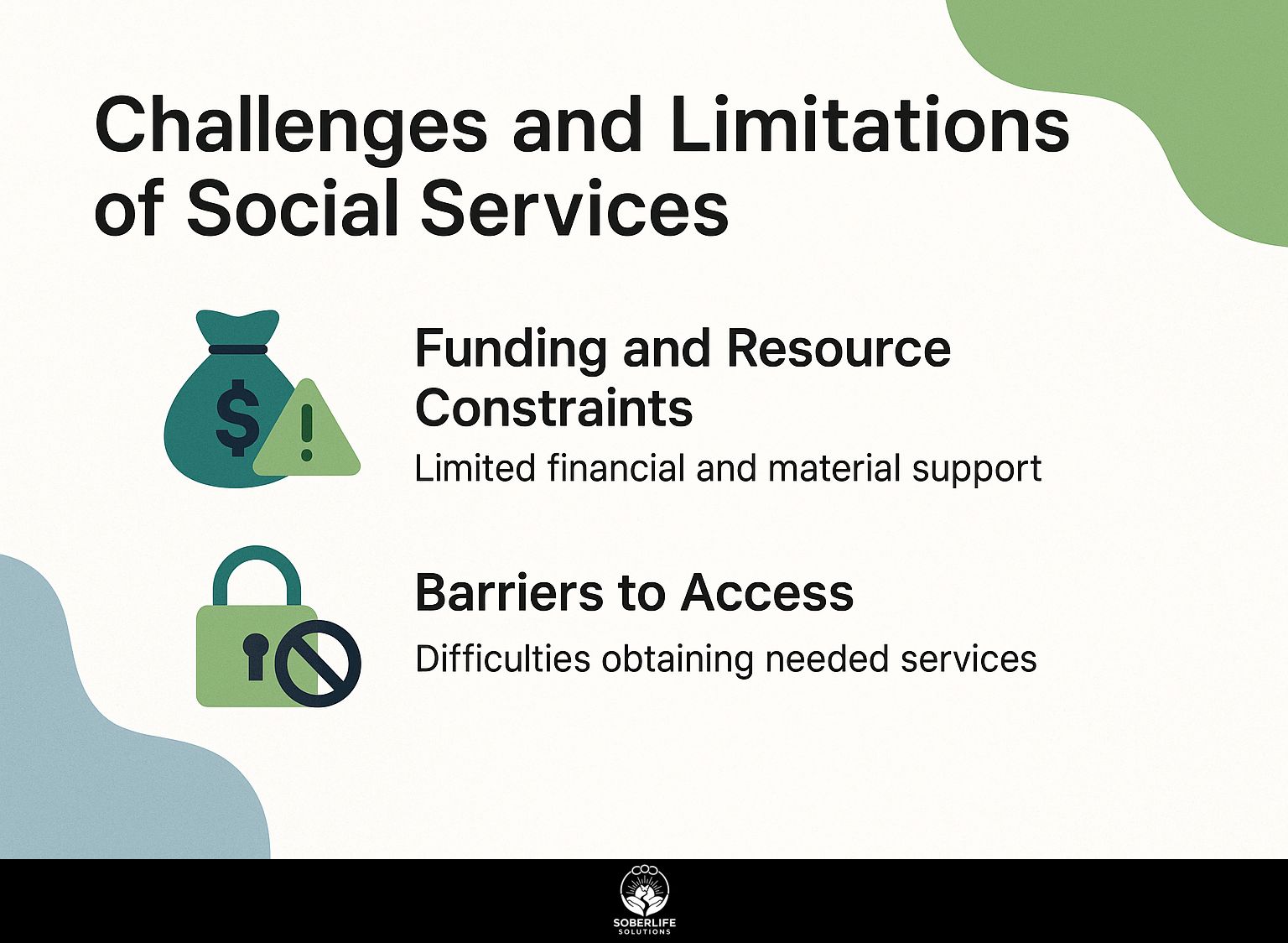
Although social services are important, they encounter many problems and restrictions that can make it difficult for them to effectively aid recovery. Implementing a chronic illness framework in substance use recovery can help address these challenges by providing a structured approach.
Funding and Resource Constraints
Lack of funding greatly reduces the ability of social services to offer full support to people in recovery.
Programs such as mental health and substance abuse treatment often experience significant budget reductions, which result in longer waiting periods and fewer services.
For instance, many community centers can only serve a fraction of those in need due to staff layoffs and reduced hours.
To address these challenges, stakeholders might consider strategies such as increasing public-private partnerships or advocating for government grants.
Utilizing online crowdfunding platforms could also enable communities to pool resources and raise funds for essential services, thereby enhancing support for recovery initiatives.
Barriers to Access
Barriers to access, such as transportation and stigma, can prevent individuals from fully engaging with available recovery support services.
To overcome these barriers, communities can implement mobile outreach programs that bring services directly to individuals, thereby eliminating transportation issues.
For instance, a local organization might collaborate with social service agencies to create a weekly van route to underserved neighborhoods.
Raising awareness through campaigns helps create an open and accepting space, encouraging people to get involved. Training staff in empathy and cultural competence further helps marginalize populations feel safe and respected, thereby increasing service uptake.
These combined strategies contribute to a more inclusive access to critical support services.
Plans for Social Services in Rehabilitation
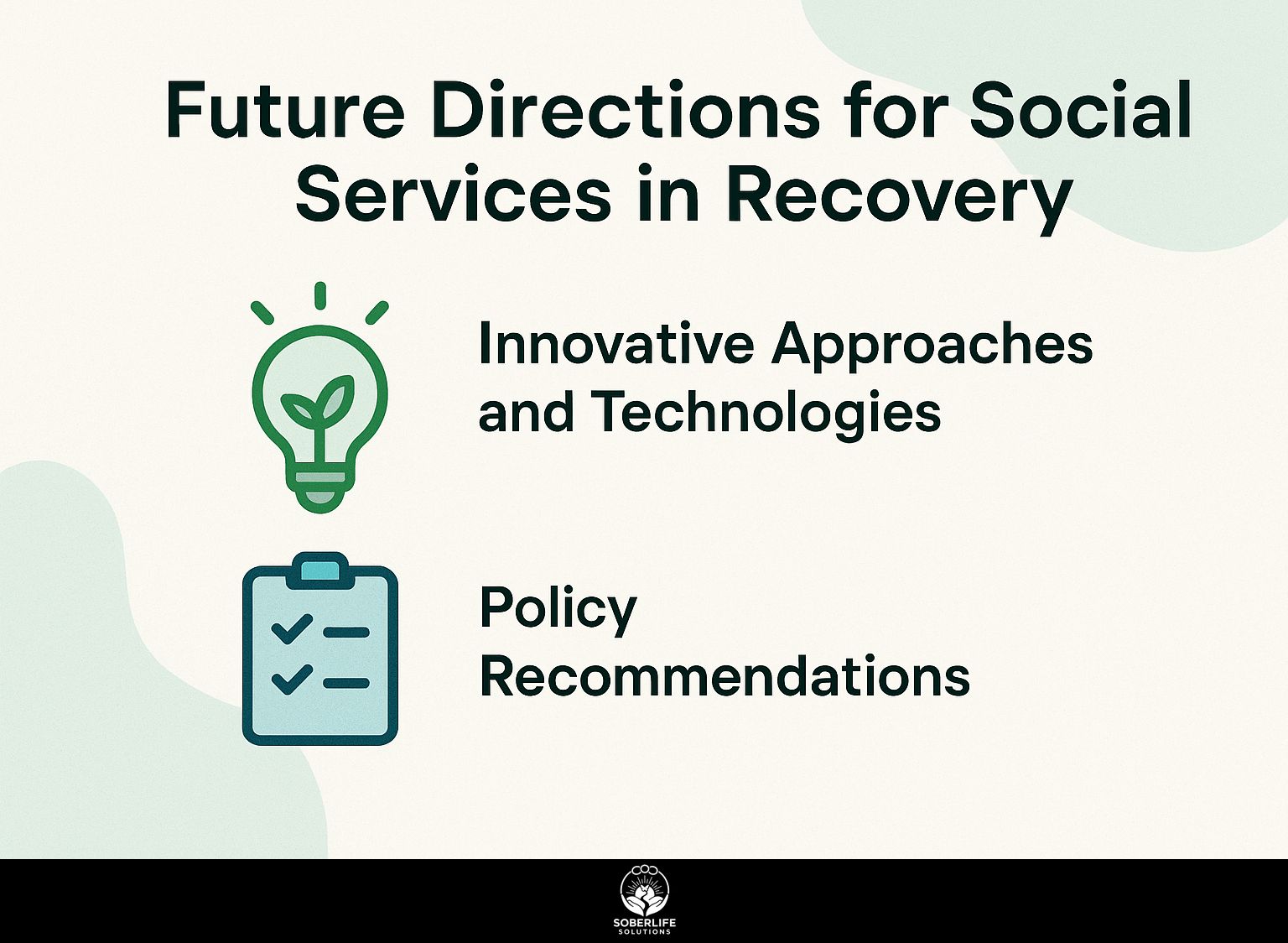
In the next few years, social services can get better by using fresh approaches and tougher rules to help people in need.
Innovative Approaches and Technologies
Emerging technologies, such as mobile apps for peer support, are revolutionizing the way social services are delivered in the recovery community.
These apps facilitate instant communication, allowing individuals in recovery to connect with peers for support anywhere and anytime.
For example, platforms like BeFriend allow users to chat and set up video calls, creating a feeling of togetherness.
AI-driven apps like Sober Grid offer social networking for recovery, letting users share their experiences and celebrate milestones.
By using these technologies, service providers can increase involvement, provide timely support, and improve recovery results for individuals going through their personal experiences.
Policy Recommendations
Suggestions for policies can make social services more effective by guaranteeing they get enough money and are available to all people in recovery.
To reach this goal, policymakers should focus on providing more money for effective recovery programs like Cognitive Behavioral Therapy (CBT) and motivational interviewing, which have shown success.
Using a layered funding structure helps allocate resources according to the needs of the community and how well programs are performing.
Collaborating with local groups can make services better. For example, joining forces with job services can help people get back to work.
Creating a system to gather feedback from people using the service will help improve the program regularly and better address the changing needs of those in recovery.
Frequently Asked Questions
What are some examples of social services that can impact QoL in recovery?
Examples of social services that can improve the quality of life in recovery include recovery support groups, mental health counseling, job rehabilitation programs, and housing help programs.
How can social services improve the quality of life for individuals in recovery?
Social services can make life better for people in recovery by giving support, addressing mental health problems, helping to find jobs, and encouraging safe and stable housing.
What role do social services play in the recovery process?
Social services are important in helping people recover by meeting their social, emotional, and practical needs. They can help individuals overcome barriers and achieve a better quality of life.
What challenges can individuals face when accessing social services in recovery?
Some common challenges individuals may face when accessing social services in recovery include limited availability of services, financial constraints, and stigma surrounding mental health and addiction. These challenges can make it difficult for individuals to access the support they need.
Are social services accessible to all individuals in recovery?
Social services are meant to be accessible to all individuals in recovery, regardless of their background or financial status. Some people might face obstacles that stop them from using these services. We need to tackle these obstacles and support equal access to social services for all people in recovery.
What can individuals do to advocate for better access to social services in recovery?
Individuals can advocate for better access to social services in recovery by reaching out to their local government officials, participating in support groups or organizations, and sharing their experiences with others. By raising awareness and advocating for change, individuals can help improve access to social services for themselves and others in recovery.

